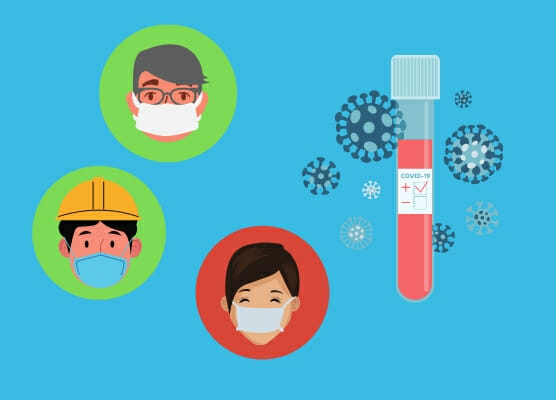Coronavirus testing at work: Who to test and how to pay for it

You can’t get everyone back into the office unless employees are healthy and feel safe. So employers have been advised to test employees for covid-19 before they walk through the door. The CDC has updated its guidelines on employee covid-19 testing.
Both the Families First and CARES Acts require group health plans and insurers to waive cost-sharing and prior authorization rules for employees who get tested in doctors’ offices, urgent care centers and hospital emergency rooms.
That’s not quite the way the IRS and the Department of Labor see it in a new set of FAQs.
Who to test
According to the CDC’s updated guidelines, the following employees should be tested to determine whether they have the coronavirus:
- Employees with signs or symptoms consistent with covid-19
- Asymptomatic employees with recently known or suspected exposure to SARS-CoV-2
- Asymptomatic employees without known or suspected exposure to SARS-CoV-2 for early identification in special settings
- Employees who come out of home isolation
- Employees who need to be tested for public health surveillance for SARS-CoV-2.
Who pays for coronavirus testing in the workplace
By far, this is the more controversial issue.
The IRS and the DOL have jointly released FAQs discussing health plans’ obligation to cover covid-19 testing at no cost to employees. These FAQs are decidedly good news/bad news for employees and group health plans.
Good news. Plans are required to cover covid-19 tests employees take at home. In addition, plans must cover multiple diagnostic tests, but caution providers to determine whether multiple tests are necessary.
Plans may offer coverage only for telehealth and other remote care services to employees who aren’t eligible for other group coverage.
Wellness programs may waive a standard, including a reasonable alternative standard, for obtaining a reward under a health-contingent wellness program. But waivers must be offered to all similarly situated individuals.
Bad news. On the other hand, group plans don’t have to pay for testing for surveillance or employment purposes, which throws a wrench into the CDC’s guidelines.
FAQ: The Families First Act only requires coverage of items and services for diagnostic testing. Testing conducted to screen for general workplace health and safety, for public health surveillance for SARS-CoV-2 or for any other purpose not primarily intended for individual diagnosis or treatment of covid-19 or another health condition, is beyond the law’s scope.
Balance billing is what’s called surprise billing—you book an appointment at an in-network imaging center for an MRI and you then get a heart attack-inducing bill from the doctor who read it, because that doctor was out-of-network, even though he or she worked for the imaging center.
The FAQs generally prohibit balance billing for services and items related to covid-19 testing. But, according to another FAQ, it’s permissible for services and items not related to covid-19 testing, even though those services or items may be provided simultaneously with covid-19 testing.







